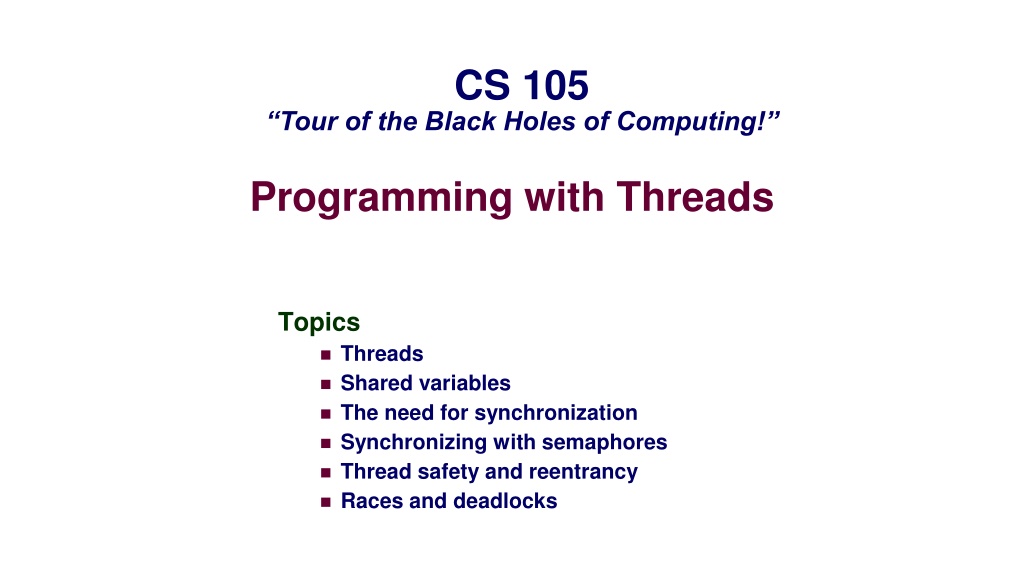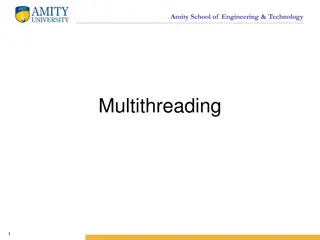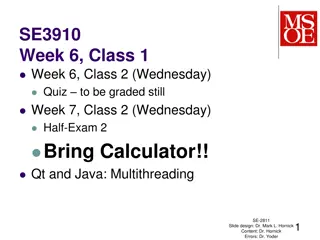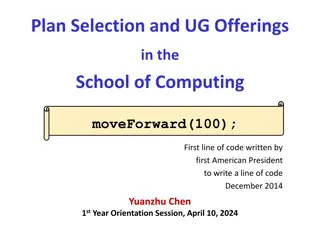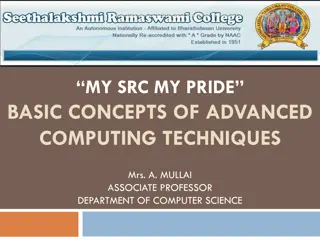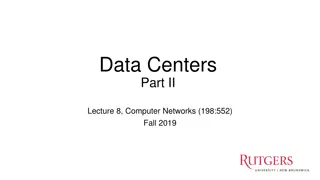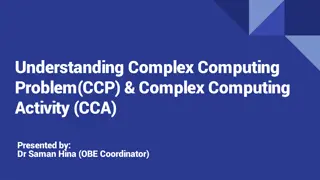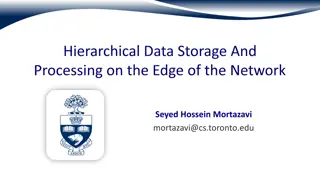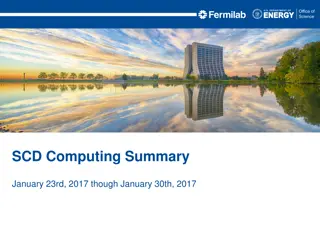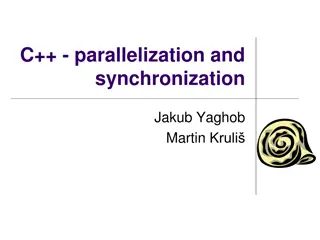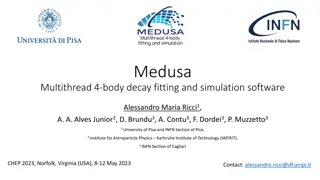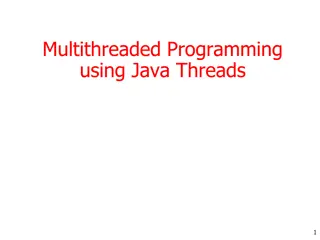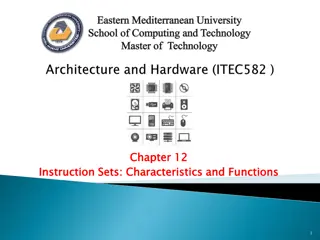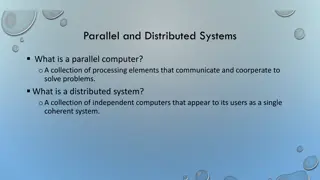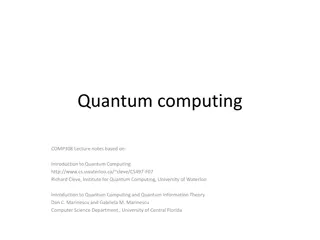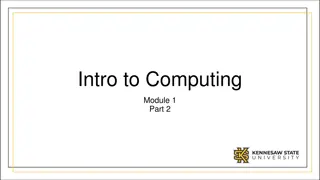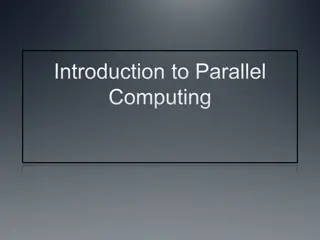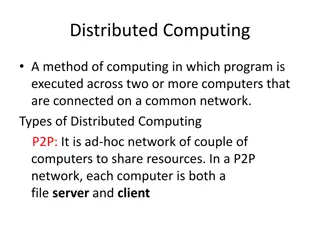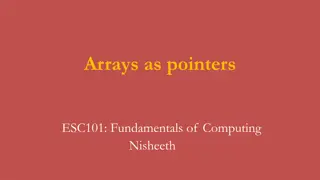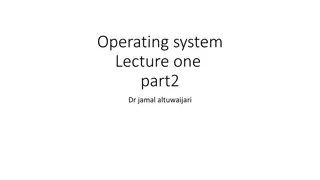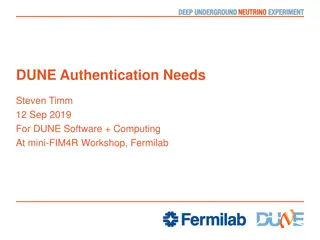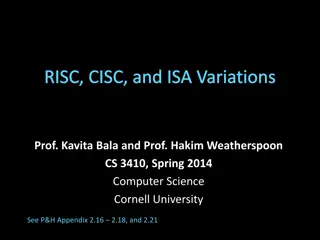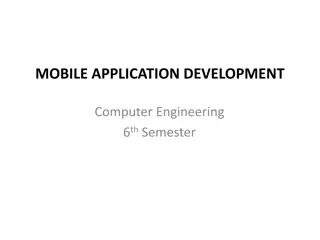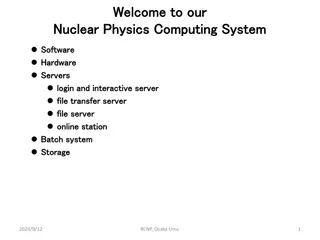Understanding Multithreading in Computing
Exploring the realms of multithreading in computing delves into topics like shared variables, synchronization with semaphores, thread safety, reentrancy, races, and deadlocks. The content illustrates the differences between the traditional and alternate views of a process, the structure of a process with multiple threads, and the logical view of threads within a pool of peers. Understanding concurrent thread execution is essential for grasping the dynamics of parallel processing in computing.
Download Presentation

Please find below an Image/Link to download the presentation.
The content on the website is provided AS IS for your information and personal use only. It may not be sold, licensed, or shared on other websites without obtaining consent from the author. Download presentation by click this link. If you encounter any issues during the download, it is possible that the publisher has removed the file from their server.
E N D
Presentation Transcript
CS 105 Tour of the Black Holes of Computing! Programming with Threads Topics Threads Shared variables The need for synchronization Synchronizing with semaphores Thread safety and reentrancy Races and deadlocks
Traditional View of a Process Process = process context + code, data, and stack Process context Code, data, and stack stack SP Program context: Data registers Condition codes Stack pointer (SP) Program counter (PC) Kernel context: VM structures File descriptor table brk pointer shared libraries brk run-time heap read/write data read-only code/data PC 0 CS 105 2
Alternate View of a Process Process = thread + code, data, and kernel context Thread (main thread) Code and Data shared libraries stack brk SP run-time heap read/write data read-only code/data Thread context: Data registers Condition codes Stack pointer (SP) Program counter (PC) PC 0 Kernel context: VM structures File descriptor table brk pointer CS 105 3
A Process With Multiple Threads Multiple threads can be associated with a process Each thread has its own logical control flow (sequence of PC values) Each thread shares the same code, data, and kernel context Each thread has its own thread id (TID) Thread 1 (main thread) Shared code and data Thread 2 (peer thread) shared libraries stack 1 stack 2 run-time heap read/write data read-only code/data Thread 1 context: Data registers Condition codes SP1 PC1 Thread 2 context: Data registers Condition codes SP2 PC2 0 Kernel context: VM structures File descriptor table brk pointer CS 105 4
Logical View of Threads Threads associated with a process form pool of peers Unlike processes, which form tree hierarchy Threads associated with process foo Process hierarchy P0 T2 T4 T1 P1 shared code, data and kernel context sh sh sh T3 T5 foo bar CS 105 5
Concurrent Thread Execution Two threads run concurrently (are concurrent) if their logical flows overlap in time Otherwise, they are sequential (same rule as for processes) Examples: Concurrent: A & B, A&C Sequential: B & C Thread A Thread B Thread C Time CS 105 6
Threads vs. Processes How threads and processes are similar Each has its own logical control flow Each can run concurrently (maybe on different cores) Each is context-switched How threads and processes are different Threads share code and data, processes (typically) do not Threads are somewhat cheaper than processes Process control (creating and reaping) is roughly 5 8 as expensive as thread control Linux numbers: ~160K, 280K, 530K cycles minimum to create and reap a process (three machines) ~19K, 34K, 100K cycles minimum to create and reap a thread CS 105 7
Posix Threads (Pthreads) Interface Pthreads: Standard interface for ~60 (!) functions that manipulate threads from C programs Creating and reaping threads pthread_create, pthread_join Determining your thread ID pthread_self Terminating threads pthread_cancel, pthread_exit exit [terminates all threads], return [terminates current thread] Synchronizing access to shared variables pthread_mutex_init, pthread_mutex_[un]lock pthread_cond_init, pthread_cond_[timed]wait, pthread_cond_signal CS 105 8
The Pthreads Hello, world" Program /* * hello.c - Pthreads "hello, world" program */ #include "csapp.h" Thread attributes (usually NULL) Thread ID void *howdy(void *vargp); Thread arguments (void *p) int main() { pthread_t tid; Pthread_create(&tid, NULL, howdy, NULL); Pthread_join(tid, NULL); exit(0); } Thread routine /* thread routine */ void *howdy(void *vargp) { printf("Hello, world!\n"); return NULL; } Thread return value (void **p) CS 105 9
Execution of Threaded Hello, world main thread call Pthread_create() Pthread_create() returns peer thread call Pthread_join() printf() main thread waits for peer thread to terminate return NULL; (peer thread terminates) Pthread_join() returns exit() terminates main thread and any peer threads CS 105 10
Pros and Cons of Thread-Based Designs + Threads take advantage of multicore/multi-CPU hardware + Easy to share data structures between threads E.g., logging information, file cache + Threads are more efficient than processes Unintentional sharing can introduce subtle and hard-to-reproduce errors! Ease of data sharing is greatest strength of threads, but also greatest weakness Hard to know what s shared, what s private Hard to detect errors by testing (low-probability failures) CS 105 11
Shared Variables in Threaded C Programs Question: Which variables in a threaded C program are shared variables? Answer not as simple as global variables are shared and stack variables are private Definition: A variable x is shared if and only if multiple threads reference some instance of x. Requires answers to the following questions: What is the memory model for threads? How are variables mapped to memory instances? How many threads reference each of these instances? CS 105 12
Threads Memory Model Conceptual model: Each thread runs in larger context of a process Each thread has its own separate thread context Thread ID, stack, stack pointer, program counter, condition codes, and general-purpose registers All threads share remaining process context Code, data, heap, and shared library segments of process virtual address space Open files and installed signal handlers (see later lecture on exceptions) Operationally, this model is not strictly enforced: Register values are truly separate and protected But any thread can potentially read and write the stack of any other thread Mismatch between conceptual and operational model is a source of confusion and errors CS 105 13
Example Program to Illustrate Sharing char **ptr; /* global */ /* thread routine */ void *thread(void *vargp) { int myid = (int)vargp; static int svar = 0; printf("[%d]: %s (svar=%d)\n", myid, ptr[myid], ++svar); return 0; } int main() { int i; pthread_t tid; char *msgs[2] = { "Hello from foo", "Hello from bar" }; ptr = msgs; for (i = 0; i < 2; i++) Pthread_create(&tid, NULL, thread, (void *)i); // Pthread_joins omitted Pthread_exit(NULL); } Peer threads reference main thread s stack indirectly through global ptr variable CS 105 14
Mapping Variable Instances to Memory Global variables Def: Variable declared outside of a function Process memory contains exactly one instance of any global variable Local variables Def: Variable declared inside function without static attribute Each thread stack frame contains one instance of each local variable Local static variables Def: Variable declared inside function with the static attribute Process memory contains exactly one instance of any local static variable. CS 105 15
Mapping Vars to Memory Instances Global variable: 1 instance (ptr [data]) Local automatic variables: 1 instance: i.m, msgs.m char **ptr; /* global */ Local automatic variable: 2 instances: myid.p0[peer thread 0 s stack], myid.p1[peer thread 1 s stack] int main() { int i; pthread_t tid; char *msgs[2] = { "Hello from foo", "Hello from bar" }; ptr = msgs; for (i = 0; i < 2; i++) Pthread_create(&tid, NULL, thread, (void *)i); // Pthread_joins omitted Pthread_exit(NULL); } /* thread routine */ void *thread(void *vargp) { int myid = (int)vargp; static int svar = 0; printf("[%d]: %s (svar=%d)\n", myid, ptr[myid], ++svar); } Local static variable: 1 instance: svar [data] CS 105 16
Shared Variable Analysis Which variables are shared? Variable instance Referenced by Referenced by Referenced by main thread? peer thread 0? peer thread 1? ptr svar i.m msgs.m myid.p0 myid.p1 yes no yes yes no no yes yes no yes yes no yes yes no yes no yes Answer: A variable x is shared iff multiple threads reference at least one instance of x. Thus: ptr, svar, and msgs are shared. i and myid are NOT shared. CS 105 17
Synchronizing Threads Shared variables are handy... but introduce the possibility of nasty synchronization errors. CS 105 18
badcnt.c: An Improperly Synchronized Threaded Program #define NITERS 1000000000 /* thread routine */ void *count(void *arg) { int i; for (i = 0; i < NITERS; i++) cnt++; return NULL; } unsigned int cnt = 0; /* shared */ int main() { pthread_t tid1, tid2; Pthread_create(&tid1, NULL, count, NULL); Pthread_create(&tid2, NULL, count, NULL); linux> ./badcnt BOOM! cnt=198841183 linux> ./badcnt BOOM! cnt=198261801 Pthread_join(tid1, NULL); Pthread_join(tid2, NULL); linux> ./badcnt BOOM! cnt=198269672 cnt should be 200,000,000. What went wrong?! if (cnt == (unsigned)NITERS*2) printf("OK cnt=%d\n", cnt); else printf("BOOM! cnt=%d\n", cnt); return 0; } CS 105 19
Assembly Code for Counter Loop C code for counter loop in thread i for (i = 0; i < NITERS; i++) cnt++; Asm code for thread i Hi: Head movl $100000000, %edx .L2: movl cnt(%rip), %eax addl $1, %eax movl %eax, cnt(%rip) subl $1, %edx jne .L2 Li : Load cnt Ui : Update cnt Si : Store cnt Ti : Tail CS 105 20
Concurrent Execution Key idea: In general, any sequentially consistent interleaving is possible, but some give an unexpected result! Ik denotes that thread k executes instruction I %rdxk is the content of %rdx in thread k s context k (thread) instrk %rdx1 %rdx2 cnt 1 1 1 1 2 2 2 2 2 1 H1 L1 U1 S1 H2 L2 U2 S2 T2 T1 - 0 1 1 - - - - - 1 - - - - - 1 2 2 2 - 0 0 0 1 1 1 1 2 2 2 Thread 1 critical section Thread 2 critical section OK CS 105 22
Concurrent Execution (cont) Incorrect ordering: two threads increment the counter, but the result is 1 instead of 2 k (thread) instri %rdx1 %rdx2 cnt 1 1 1 2 2 1 1 2 2 2 H1 L1 U1 H2 L2 S1 T1 U2 S2 T2 - 0 1 - - 1 1 - - - - - - - 0 - - 1 1 1 0 0 0 0 0 1 1 1 1 1 Oops! CS 105 23
Concurrent Execution (cont) How about this ordering? k (thread) instri %rdx1 %rdx2 cnt 0 1 1 2 2 2 2 1 1 1 2 H1 L1 H2 L2 U2 S2 U1 S1 T1 T2 0 0 1 1 1 1 1 1 1 Oops! 1 We can analyze the behavior using a progress graph CS 105 24
Progress Graphs Thread 2 Progress graph depicts discrete execution state space of concurrent threads T2 (L1, S2) Each axis corresponds to sequential order of instructions in a thread S2 U2 Each point corresponds to a possible execution state (Inst1, Inst2) L2 H2 E.g., (L1, S2) denotes state where thread 1 has completed L1 and thread 2 has completed S2 Thread 1 H1 L1 U1 S1 T1 CS 105 25
Trajectories in Progress Graphs Thread 2 A Trajectory is sequence of legal state transitions that describes one possible concurrent execution of the threads T2 S2 Example: U2 H1, L1, U1, H2, L2, S1, T1, U2, S2, T2 L2 H2 Thread 1 H1 L1 U1 S1 T1 CS 105 26
Critical Sections and Unsafe Regions Thread 2 L, U, and S form a critical section with respect to the shared variable cnt T2 S2 Instructions in critical sections (w.r.t. to some shared variable) should not be interleaved U2 Unsafe region Sets of states where such interleaving occurs form unsafe regions L2 H2 Thread 1 H1 L1 U1 S1 T1 CS 105 27
Safe and Unsafe Trajectories Thread 2 T2 Def: A trajectory is safe iff it doesn t enter any part of an unsafe region S2 U2 Claim: A trajectory is correct (w.r.t. cnt) iff it is safe Unsafe region L2 H2 Thread 1 H1 L1 U1 S1 T1 CS 105 28
Races Race happens when program correctness depends on one thread reaching point x before another thread reaches point y void *thread(void *vargp); /* a threaded program with a race */ int main() { pthread_t tid[N]; int i; for (i = 0; i < N; i++) Pthread_create(&tid[i], NULL, thread, &i); for (i = 0; i < N; i++) Pthread_join(tid[i], NULL); exit(0); } /* thread routine */ void *thread(void *vargp) { int myid = *((int *)vargp); printf("Hello from thread %d\n", myid); return NULL; } CS 105 30
Enforcing Mutual Exclusion Question: How can we guarantee a safe trajectory? Answer: We must synchronize the execution of the threads so that they can never have an unsafe trajectory. i.e., need to guarantee mutually exclusive access to critical regions Classic solution: Semaphores (Edsger Dijkstra) Other approaches Mutex and condition variables (Pthreads ringbuf lab) Monitors (Java) Rendevous (Ada) CS 105 31
Pthread Mutexes Part of Posix pthreads package Only one thread can hold a given mutex at one time Mutex is associated with specific critical region or shared variable(s) Can use multiple mutexes to control different critical regions pthread_mutex_lock: Grabs given mutex and returns If some other thread already has mutex, waits until it s free pthread_mutex_unlock: Releases mutex and makes it available to other threads If any threads are waiting for mutex, wakes one up at random and gives mutex to it CS 105 32
Sharing With Pthread Mutexes /* goodcnt.c - properly sync d counter program */ #include <pthread.h> #define NITERS 10000000 /* thread routine */ void *count(void *arg) { int i; unsigned int cnt; /* counter */ pthread_mutex_t mutex; /* lock */ for (i = 0; i < NITERS; i++) { pthread_mutex_lock(&mutex); cnt++; pthread_mutex_unlock(&mutex); } return NULL; } int main() { pthread_t tid1, tid2; pthread_mutex_init(&mutex, NULL); /* create 2 threads and wait */ ... if (cnt == (unsigned)NITERS*2) printf("OK cnt=%d\n", cnt); else printf("BOOM! cnt=%d\n", cnt); return 0; } Why not just put lock/unlock around the whole loop? Best to give value; see thread_sleeps.c CS 105 33
Why Mutexes Work Thread 2 1 1 1 1 0 0 0 0 T2 Provide mutually exclusive access to shared variable by surrounding critical section with lock and unlock operations on mutex named m 1 1 1 1 0 0 0 0 Unlck(m) Forbidden region -1 -1 0 0 0 0 -1 -1 S2 Creates forbidden region that encloses unsafe region and is never touched by any trajectory 0 0 0 0 -1 -1 -1 -1 U2 Unsafe region -1 0 0 0 0 -1 -1 -1 L2 0 0 0 0 -1 -1 -1 -1 Lck(m) 1 1 1 1 0 0 0 0 Initially m = 1 H2 1 1 1 1 0 0 0 0 H1 Lck(m) L1 U1 S1 Unlck(m) T1 Thread 1 CS 105 34
Deadlock Locking introduces potential for deadlock: waiting for a condition that will never be true. Thread 2 deadlock state Unlck(a) forbidden region for a Any trajectory that enters deadlock region will eventually reach deadlock state, waiting for either a or b to become nonzero. Unlck(b) Lck(a) Other trajectories luck out and skirt deadlock region. forbidden region for b deadlock region Lck(b) Unfortunate fact: deadlock is often non-deterministic (thus hard to detect). Thread 1 Note: deadlocks are not considered to be races Lck(a) Lck(b) Unlck(a) Unlck(b) CS 105 35
Bad Waiting void *cnt_thread(void *vargp) { for (long i = 0; i < 200000; i++) cnt++; void *wait_thread(void *vargp) { while (cnt != 1000) ; /* Just keep swimming */ return NULL; } return NULL; } Sometimes works, sometimes runs forever while condition is checked while other thread is updating Might skip right over value of 1,000 Need way to check after each increment of cnt Requires handshaking between cnt_thread and wait_thread CS 105 36
Synchronization With Pthread Conditions Often need more than just mutual exclusion Thread B wants to wait for thread A to do something (X) Simple approach: mutex, Did A do X? , release mutex, loop Called polling Wasteful of CPU (though sometimes still preferred) Better approach: pthread conditions B says Wait for A to tell me about X A says I did X B continues Pthread condition variables One special variable per thing that can happen (e.g., x_happened ) Also need associated mutex Thread B must grab mutex (we ll see why in a moment), check the condition, then call pthread_cond_wait Process of waiting releases mutex, pauses until X happens, then re-grabs mutex Thread A simply calls pthread_cond_signal No need to hold mutex (but OK if you do) IMPORTANT: If nobody is waiting, the signal is lost! CS 105 37
Pthread Waiting pthread_cond_t condition = PTHREAD_COND_INITIALIZER; pthread_mutex_t mutex = PTHREAD_MUTEX_INITIALIZER; ... int some_other_variable; ... Best to give attributes; see thread_sleeps.c Pthread_mutex_lock(&mutex); while (!some condition on some variables) Pthread_cond_wait(&condition, &mutex); do something with those variables--we hold the mutex! Pthread_mutex_unlock(&mutex); Decision to wait is based on outside variables (example coming) Must check condition while holding a mutex Decision to wait must be made atomically Otherwise, could decide to wait, then other thread could signal before we actually wait Remember signals are lost if nobody is waiting Must re-check condition after being awoken Possible that another thread got mutex first and changed status CS 105 38
Pthread Synchronization (Sender) int n_sends = 0; pthread_mutex_t sending = PTHREAD_MUTEX_INITIALIZER; pthread_cond_t sent = PTHREAD_COND_INITIALIZER; void* sender(void* data) { int i; See handout code for best way to initialize mutexes for (i = 0; i < NPASSES; i++) { sleep(1); printf("Sender sent %d time(s)\n", i + 1); Pthread_mutex_lock(&sending); ++n_sends; Pthread_mutex_unlock(&sending); Pthread_cond_signal(&sent); } return NULL; } OK to swap order CS 105 39
Pthread Synchronization (Receiver) void* receiver(void* data) { int messages_seen = 0; while (1) { if (messages_seen >= NPASSES) { printf(" Receiver saw %d messages\n", messages_seen); return NULL; } Signal means this might have happened so need to re-check after wakeup pthread_mutex_lock(&mutex); while (n_sends == messages_seen) { pthread_cond_wait(&sent, &mutex); } pthread_mutex_unlock(&mutex); See handout code for proper error handling ++messages_seen; printf(" Receiver saw %d messages...", messages_seen); if (n_sends == messages_seen) { int sleep_time = random() % 4; if (sleep_time != 0) { printf("sleeping %d second(s)\n", sleep_time); sleep(sleep_time); } } else printf("continuing immediately\n"); } } CS 105 40
Thread Safety Functions called from a thread must be thread-safe We identify four (non-disjoint) classes of thread-unsafe functions: Class 1: Failing to protect shared variables (use mutexes to fix) Class 2a: Relying on persistent state across invocations (see below) Class 2b: Returning pointer to static variable (see below) Class 3: Calling thread-unsafe functions (obviously) CS 105 41
Thread-Unsafe Functions (cont) Class 2a: Relying on persistent state across multiple function invocations Random number generator relies on static state Fix: Rewrite function so that caller passes in all necessary state /* rand - return bad pseudo-random integer on 0..32767 */ static unsigned int next = 1; int rand(void) { next = next*1103515245 + 12345; return next/65536 % 32768; } /* srand - set seed for rand() */ void srand(unsigned int seed) { next = seed; } CS 105 42
Class 2a (fixed) Caller now passes (and thus must declare) the static state /* rand - return bad pseudo-random integer on 0..32767 */ int safe_rand(unsigned int *next) { *next = *next*1103515245 + 12345; return *next/65536 % 32768; } /* srand - set seed for rand() */ void safe_srand(unsigned int *next, unsigned int seed) { *next = seed; } CS 105 43
Thread-Unsafe Functions (cont) struct hostent *gethostbyname(char* name) { static struct hostent h; <contact DNS and fill in h> return &h; } Class 2b: Returning pointer to static variable Fixes: 1. Rewrite code so caller passes pointer to struct Issue: Requires changes in caller and callee 2. Lock-and-copy Issue: Requires only simple changes in caller (and none in callee) All callers must follow locking protocol Also, caller must manage memory hostp = Malloc(...); gethostbyname_r(name, hostp); Why outside the mutex? struct hostent *gethostbyname_ts(char *p) { struct hostent *q = Malloc(...); pthread_mutex_lock(&hostlock); p = gethostbyname(name); *q = *p; /* copy */ pthread_mutex_unlock(&hostlock); return q; } CS 105 44
Thread-Safe Library Functions Most functions in the Standard C Library (at the back of your K&R text) are thread-safe Examples: malloc, free, printf, scanf All Unix system calls are thread-safe Library calls that aren t thread-safe: Thread-unsafe function Class asctime ctime gethostbyaddr gethostbyname inet_ntoa localtime rand Reentrant version asctime_r ctime_r gethostbyaddr_r gethostbyname_r (none) localtime_r rand_r 3 3 3 3 3 3 2 CS 105 46
Threads Summary Threads provide another mechanism for writing concurrent programs Threads are growing in popularity Somewhat cheaper than processes Easy to share data between threads However, the ease of sharing has a cost: Easy to introduce subtle synchronization errors Tread carefully with threads! For more info: D. Butenhof, Programming with Posix Threads , Addison-Wesley, 1997 CS 105 47
